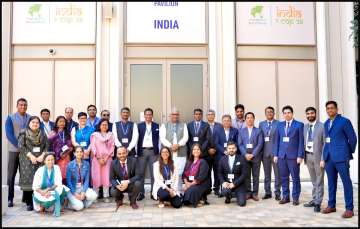'Equity and climate justice': India calls for implementation of Paris Agreement at COP28
Union Environment Minister Bhupender Yadav's statement came as COP28 negotiators reached a crucial deal calling on 'transitioning away' from fossil fuels. The document urged countries to accelerate efforts toward the phase-down of unabated coal power, but did not mention 'phase out'.

India on Wednesday urged global leaders at the UN Climate Change Conference (COP28) to implement the Paris Agreement through the Global Stocktake process with a strong focus on the principles of equity and climate change. This came after the COP28 negotiators reached a crucial deal calling on 'transitioning away' from fossil fuels.
Speaking at the closing plenary of the COP28, Union Environment Minister Bhupender Yadav said the collective efforts here have sent positive signals to the world in reinforcing commitment to maintaining the temperature goals set in Paris. "The way ahead must be based on equity and climate justice, let us implement the Paris Agreement in letter and spirit through the Global Stocktake process," he said.
The first Global Stocktake deal was adopted after almost two weeks of hectic negotiations and urged countries to accelerate efforts toward the phase-down of unabated coal power, which is a climb down after India and China strongly resisted the singling out of coal.
"Today, the world came together at COP28 in Dubai, UAE to display positive collaboration and camaraderie for an action-oriented approach towards a greener and healthier planet. Through its G20 Presidency steered by PM Shri @narendramodi ji, India displayed the resolve to make climate action a collaborative process that ‘leaves no one behind’. At COP28, India extended the same spirit enshrined in the principle of Vasudhaiva Kutumbakam," he said on X, while congratulating the United Arab Emirates (UAE) for its presidency.
"India, under PM Modi, has already achieved its earlier NDCs set for 2030 and revised them upwards affirming continued commitment. India will continue to walk this path with utmost responsibility, and show how economy and ecology can go hand in hand," he added.
What does the deal entail?
The latest draft deal of the UN Climate Change Conference (COP28) called on countries to "transition away" from the use of fossil fuels, but stopped short of mentioning the process of "phase out", which earlier drew criticism from the United States, the European Union and climate-vulnerable countries.
As COP28 President Sultan al-Jaber gavelled through the agreement, the room full of negotiators at the COP28 to the United Nations Framework Convention on Climate Change (UNFCCC) burst into applause. The document suggested a transition in a "just and equitable" manner and accelerating action in the current decade.
Laying the steps to combat climate change and reducing greenhouse emissions in line with the 1.5 degrees Celsius, the document mentioned, "accelerating efforts towards the phase-down of unabated coal power", "transitioning away from fossil fuels in energy systems, in a just, orderly and equitable manner" and "phasing out inefficient fossil fuel subsidies that do not address energy poverty or just transitions".
The new COP28 deal also called on countries to triple renewable energy capacity globally and doubling the global annual rate of energy efficiency improvements by 2030. In a first, the document includes a clear reference to the use of all fossil fuels. However, unlike the previous versions, it lacks references to “limiting the permitting of new and unabated coal power generation".
"It is a balanced plan that tackles emissions, bridges the gap on adaptation, re-imagines global finance, and delivers on loss and damage,” said the COP28 President.
Challenges to agreement on oil
A coalition of over 100 countries has pushed for an agreement that would promise an eventual end to the use of oil for the first time. However, these efforts have met stiff opposition from the oil producer group Organization of the Petroleum Exporting Countries (OPEC).
COP28 President Sultan Al Jaber, who led the call for a paradigm shift, urged the nearly 200 countries at the talks to redouble their efforts to finalise a deal ahead of the scheduled close of the conference on Tuesday, saying they "still have a lot to do".
It is widely considered that emissions from fossil fuels are by far the main driver of climate change, but 30 years of international climate negotiations have never resulted in a global agreement to cut their use. The last text triggered protests from dozens of delegates who stood in near silence and were seen forcing the negotiators to come up with a better deal.
"We're not where we're meant to be in terms of the text. Many of us have called for the world to largely phase out fossil fuels, and that starts with a critical reduction this decade," said US Special Climate envoy John Kerry.
(with inputs from agencies)